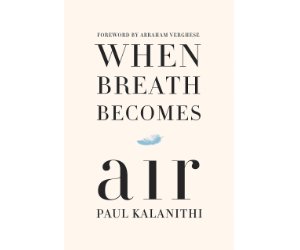Last Updated on March 14, 2019 by
If you read one book this year, make it When Breath Becomes Air. Do yourself a favor – do not read another word about this book before picking it up and experiencing it for yourself with as little foreknowledge as possible. For those of you who just can’t help yourselves, read on but be warned: due to the nature of the content there will be some spoilers.
Written by the late Dr. Paul Kalanithi as his memoir, the book chronicles his transition from student to physician to patient to husband and finally to parent. In the prologue the author sets an expectation of brutal honesty – an expectation that is more than met by the final paragraphs. One can’t help but wonder if being freed of the consequences of completely revealing his inner thoughts due to his impending demise, perhaps he had a freedom that otherwise would have been lacking. Regardless the end result is a treasure unlike anything that has come before. In turns humorous, serious, moving, thought-provoking, and entertaining, this story is bound to be one of the most celebrated of 2016.
Things get off to a somewhat rocky start in an overlong and perhaps slightly pretentious forward. It may be best to just skip that section altogether. Soon however the reader begins the journey of discovery which unfolds and any lingering doubts about the quality of the work fade away. It is easy to wonder if Dr. Kalanithi didn’t perhaps miss his true calling as an author. His gift with the written word cannot be denied. Written in prose, it almost has a poetic quality. This has the potential to become a classic audiobook given the right narrator. With respect to those he left behind, it is easy as you read his story to think that perhaps the biggest tragedy is that this will be his singular contribution to literature—but what a contribution it is!
Healthcare professionals will find it easy to relate to his early experiences of role-reversal. Who among us has never felt the awkwardness of being on the wrong side of the stethoscope? It is easy to sympathize with Dr. Kalanithi as he describes the early days of suspecting something is wrong and going to get checked out by a colleague. While most readers are not likely to be able to relate to being given a terminal diagnoses, the way the author weaves the narrative it is easy to relate to the very difficult decisions he had to make as he comes to terms with his situation.
At no point is the story weighted down with lengthy medical explanations and no medical knowledge is required to follow the author on his journey to death. Dr. Kalanithi gives his audience a level of respect not often seen in medical literature and never assumes that any lengthy explanations would be necessary or beneficial. Potential physician authors should take note of how expertly the material is presented here.
The book is not organized into chapters in the conventional sense, rather it is broken into a couple large sections. At first it is a little jarring but quickly it becomes unthinkable that it would be written any other way—his story flows naturally from one element to the next without the need for pointless chapter breaks. He begins with his childhood and takes us right to the end of his life. He peppers his story with interesting anecdotes and jokes, breaking up what would otherwise be a tragedy too depressing to bare.
It is also quite philosophical, asking not just “What is the meaning of life?” but also much more nuanced questions about what it means to face death with dignity or at what point is life not worth living. He has the unique perspective of someone who studied literature and philosophy (and boy does it show!) then went on to become a neurosurgeon and then finally had to face death personally. This perspective is one he shares freely with the reader. Much of the value of the book comes from his perspective and how he chooses to bring the reader into his life and world.
Most readers will be able to finish this book in one sitting if they are so inclined. However this would be a mistake, as it is much more rewarding to break it up into multiple reading sessions. That is not to imply that the book is too demanding, you simply do not want it to end. Much like the author’s life, the story is simply much too short and over too soon. Like a fine meal it is best to savor the experience and not rush to finish. There are a lot of meaty issues to digest along the way as well.
It is not possible to do this masterpiece of literature justice, but rest assured from the beautiful prose to the pungent metaphors to the vivid imagery this is a story that will stay with you and you won’t want it any other way. Just reading his memoir and then forgetting about it is unthinkable. Do yourself a favor and pick up your copy today.

